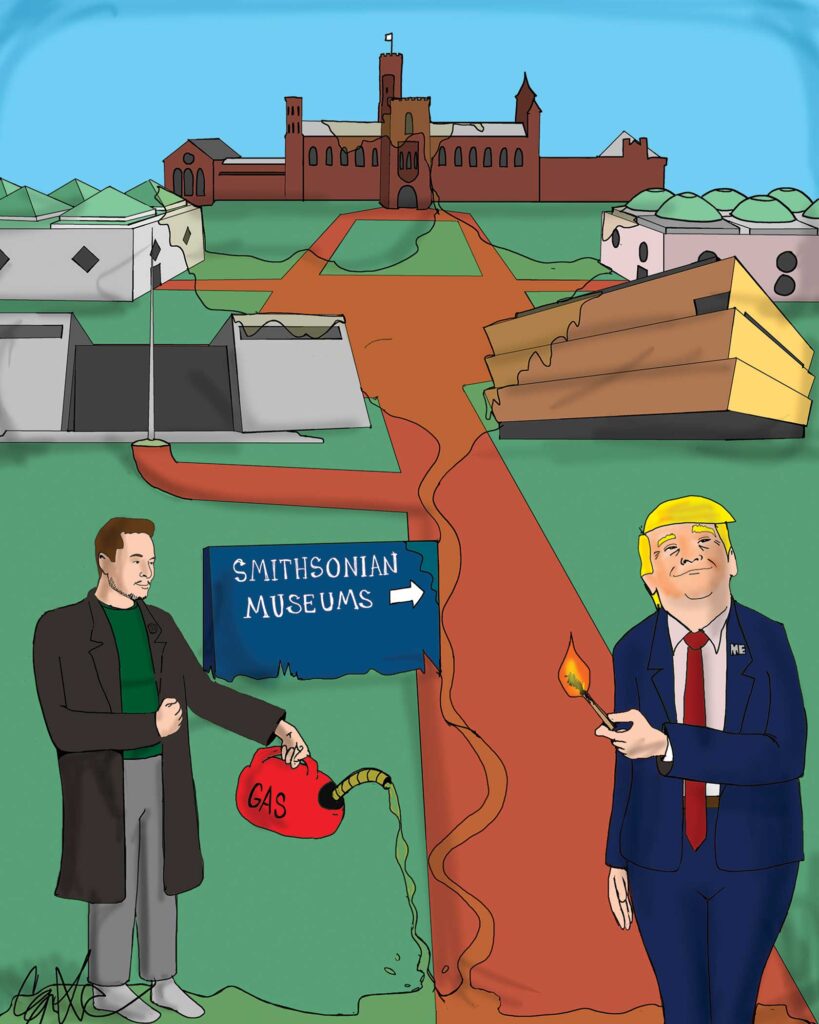
The authoritarian impulse to rewrite and even erase history to create a self-serving narrative is an assault on truth itself. Whether revisionism springs from the Soviet Union’s Joseph Stalin, China’s Chairman Mao, Germany’s Adolf Hitler or the American South’s Daughters of the Confederacy, the intent is the same: To shape historical memory to serve the purpose of the oppressor.
As part of its initial war on “wokeness,” President Donald Trump banned diversity, equity and inclusion from the federal vocabulary and shuttered DEI offices. The administration stupidly removed references to Jackie Robinson and the Tuskegee Airmen from the Department of Defense website until a public outcry forced a reversal of the decision.
The awkward effort at literally whitewashing the history of America’s armed forces turned out to be merely a prelude to a much broader and more dangerous strategy to suppress the truth of American history. The administration is now taking aim at the nation’s premier repository of Black historical memory – the National Museum of African American History and Culture, located in Washington, D.C., and part of the Smithsonian Institution’s nearly two dozen properties.
In another ill-conceived executive order signed last week, Trump singled out the “Blacksonian,” one of the country’s most popular museums, for criticism in a measure that curbs the independence of the Smithsonian in order to create a more positive view of U.S. history. Under Trump’s worldview, the Smithsonian’s 21 museums, libraries, research centers and the National Zoo should serve as a “symbol of inspiration and American greatness.”
Trump’s order, entitled “Restoring Truth and Sanity to American History,” is in fact a directive to promote selective truths to create, by sins of omission, a false narrative — turning our layered history of the freedom struggle into a kumbaya celebration of the white man’s beneficent guiding hand.
The founding story of the United States is not complete without acknowledging the role that slavery and racial bias played in the formation of our economy and polity. Our country is made stronger, not weaker, by facing the facts, which include a debate over slavery by the Founding Fathers, a Civil War fought over restricting and then ending involuntary bondage; a century of Jim Crow rule in the South; and a continuing assault on hard-fought victories to secure voting, housing, employment and public-accommodation rights.
According to Trump, the Smithsonian, created by Congress with two-thirds of its $1 billion budget funded by taxpayers, engages in a “concerted and widespread effort to rewrite our nation’s history.” Trump calls out the National Museum of African American History by name as part of his baseless attack, saying it operates “under the influence of a divisive, race-centered ideology.” Trump is targeting federal funding for the museum and empowering Vice President JD Vance to questionably hold sway over the Smithsonian’s independent board of regents to prohibit programs that “degrade shared American values” or “divide Americans based on race.”
In what world do Trump and his enablers live? Certainly not one that recognizes the truth that the Constitution itself divided Americans by race. How does taking on that truth “degrade” our values? Our continuing history to overcome racist measures in our founding document should be celebrated as “shared American values.”
Over one million visitors a year to the National Museum of African American History and Culture tour exhibits that don’t flinch at telling uncomfortable truths. Its striking edifice, located in the shadow of the Washington Monument, traces the full scope of Black history, from the horrors of the Middle Passage to contemporary cultural trends throughout the African diaspora. Under Trump’s definition of divisive, it’s hard to see whether the museum can weather White House scrutiny – or whether any institution devoted to a particular demographic, from the U.S. Holocaust Memorial Museum of the National Museum of the American Indian, could survive Trump’s ideological axe.
The president has also targeted the American Women’s History Museum, still under development, for allegedly planning “to celebrate male athletes participating in women’s sports.”
Black Boston has long recognized the essential role in seizing our historical narrative. Boston’s Museum of African American History began mounting exhibitions over 60 years ago and maintains historical properties on Beacon Hill and on Nantucket marking the long history of Black struggle and achievement in the Cradle of Liberty. Kevin Young, the director of the National Museum of African American History in Washington, is a Harvard graduate and a poet with deep ties to Boston. Lonnie G. Bunch III, the current secretary of the Smithsonian, once held Young’s position and has vociferously defended presentations of our national history to reflect its sometimes-disturbing complexity.
“It seems like we’re headed in the direction where there’s even an attempt to deny that the institution of slavery even existed,” a Morehouse College professor told the Associated Press, “or that Jim Crow laws and segregation and racial violence against Black communities, Black families or Black individuals even occurred.”
The notion that truth and freedom are interdependent was eloquently stated by Thomas Jefferson, the former president whose intimate relationship with his slave Sally Hemings was the topic of an early exhibit in the National Museum of African American History and Culture. As an illustration of nuance in historical accounting, we can condemn the master of Monticello for forcing himself on a helpless Black teenager while acknowledging his contributions to political rhetoric. “A nation which expects to be ignorant and free in a state of civilization,” wrote Jefferson, “expects what never was and never will be.” Make no mistake, the battle over truth-telling in our nation’s museums is a battle over freedom.
Ronald Mitchell
Editor and Publisher, Bay State Banner







